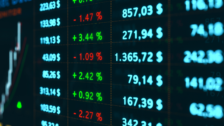Hamish Douglass sees signs of ‘speculative frenzy’ amid FOMO-driven markets
Hamish Douglass this week presented his ‘The Year of Living Dangerously Webinar’, to thousands of investors and followers across the country. There were no crowds or pyrotechnics, just what appeared to be another Zoom call from Magellan’s Sydney offices. But what the session may have lacked in technology, it delivered in terms of content, analysis and insights on recent moves in global markets.
Douglass was quick to accept that the key global equity funds had underperformed in recent months, particularly since the vaccine-led recovery in November. The flagship Magellan Global Fund is down some 6.9%, compared to a 0.7% gain from the MSCI index in the 12 months to 31 January. Douglass made it clear he was “not concerned about performance,” perhaps at risk of putting investors offside, but he reiterated the downside protection his funds have offered over the years.
According to Douglass, the Magellan Global Fund is among the top 1% of global equity managers when it comes to downside protection and performance during heavy market sell-offs. In 2020, he put this, along with the recent underperformance, down to a portfolio that includes close to 50% in what he termed “defensive” assets, including utilities, consumer staples and good old-fashioned cash.
The first half of the webinar, structured as a script reading for a Netflix series, which happens to be a top ten holding of the fund, centred around the under-appreciated risk and complexity that stands in financial markets today. It was story-telling at its finest, highlighting two potential outcomes and speaking extensively on what he believes to be the “under-appreciated risk” of a mutant COVID-19 strain that moves more quickly than current vaccines can manage.
Douglass highlighted recent data suggesting the falling efficacy of vaccine treatments against the South African and Brazilian strains as a cause for concern, but noted the portfolio is close to fully invested, holding just 4% cash, down from 20% in 2020. He was clear that there was less certainty in “the science” than markets seemed to be factoring-in, noting that investment experts are now focused on understanding the economic recovery, having moved on from the pandemic, or season one of his series.
It is clear to Magellan that heuristic (or behavioural) biases are driving market returns and increasing the likelihood of volatility. Confirmation bias, where we seek only evidence of our preferred outcome; over-simplification, where we ignore alternative courses of action; and most importantly FOMO, or the fear of missing out, have combined into what he termed a “supercharged sure bet” on risk-taking. The investment team is growing increasingly wary of valuations, flagging the “speculative frenzy in certain assets,”but not the markets in general, as markets begin to “hear what they want to hear.”
Questions from the floor made for the most interesting analysis, spanning recent underperformance, modern monetary theory (MMT) and the threat of inflation. Commenting on the latter, Douglass sees a sustained increase in inflation as a “disaster for financial markets,” which have benefited significantly from loose monetary policy and access to capital. That said, he doesn’t expect this to occur in the short to medium term. Rather, he predicts a transitory period of inflationary data as stimulus “works through’ the economy, before the economy ultimately reverts back to below trend growth with parallels to the Japanese “lost decades” of 1991-2001.
Chinese e-commerce and digital payments giant Alibaba were a particular focus for investor questions, following the company’s stalled IPO of its ANT Financial fintech business. Magellan had been able to negotiate what was the 12th largest share issue in the world in the lead-up to the float, until CEO Jack Ma made some unfortunate comments in a speech in Shanghai in October, that attracted the ire of the government (evidently, Xi Jinping personally), and the float was canned. While unexpected, it was clearly a difficult outcome to predict, with Douglass confirming that the Alibaba story wasn’t “broken” and remains well and truly on track to deliver the consistent returns investors expect.
For inquisitive minds, it appeared the two books on Hamish’s desk were of course the tomes of Warren Buffett, but also a recent release, David Sanger’s The Perfect Weapon, which delves into the growing importance of cybersecurity around the world; perhaps pointing to a new investment opportunity.










